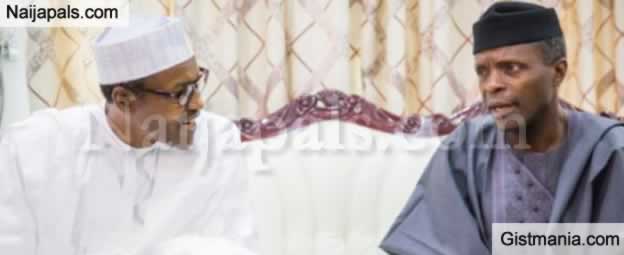
The Chairman of the Code of Conduct Bureau, Mohammed Isah, has explained why the outfit will not release the asset details of President Muhammadu Buhari and Vice President Yemi Osinbajo, despite public requests.
empowers the Bureau to retain in its custody details of assets declared by a public office holder and make them available for inspection upon request by any citizen of Nigeria, on the terms and conditions prescribed by the National Assembly.
The official did not say why the CCB has not asked the National Assembly to prescribe the conditions. He also did not state if the CCB plans to ask the National Assembly to do so.
The establishes the right of anyone to request information in the custody of any public official, agency or institution, with the exception of security files which are not of public concern.
Requests
In 2015, a coalition of groups requested the Bureau to make public the asset declaration forms filed by Messrs Buhari and Osinbajo.
However, the CCB declined their requests, citing
Many questioned the lack of consistency by the Bureau, especially when the details of assets filed by the former chief justice of the federation, Walter Onnoghen, was accessed by Dennis Aghanya, a former aide to the president.
On the heel of the suspension of Mr Onnoghen, after he was accused of withholding the full declaration of his assets, the Socio-Economic Rights and Accountability Project (SERAP) again requested
It said it
The group has since sued the CCB.
Unwilling president
Before his first election as president, Mr Buhari had promised to make public a comprehensive list of his declaration at the CCB. Although he denied ever making such promise, Report found his denial to be untrue.
He did submit his declaration particulars to the CCB, and the Bureau followed this with its verification but the president reneged on his promise to make public the content of his declaration.
After a public backlash, the president, through a statement from his spokesperson, Garba Shehu, in September 2015, reeled out only sketchy details of assets and liabilities filed by President Buhari.
Mr Buhari, according to the statement, was said to have N30 million in his bank account before taking office on May 29, 2015.
This is alongside five houses in Kaduna, Daura, Kano and Abuja; two undeveloped plots of land, one in Kano and the other in Port Harcourt.
Also, Mr Buhari was said to have farms, an orchard, ranch, livestock including 270 cattle, 25 sheep, five horses, a variety of birds and a number of economic trees, and a
Vice President Osinbajo in his declaration said he had N94 million and $900,000 in his bank account.
He also owned a 4-bedroom residence at Victoria Garden City, Lagos; a 3-bedroom flat at 2 Mosley Road, Ikoyi; a 2-bedroom flat along Lagos-Ibadan Expressway; and a 2-bedroom mortgaged property in Bedford, England.
Also, together with his law firm, known as SimmonsCooper, Mr Osinbajo was said to be a shareholder in six Lagos-based firms: Octogenerium Ltd., Windsor Grant Ltd., Tarapolsa, Vistorion Ltd., Aviva Ltd. and MTN Nigeria.
Other details like the addresses and value of the listed houses and assets and their liabilities were withheld in the release.
Also, the assets of their spouses and unmarried children under 18, as the law demands, were not contained therein.
Again in 2019, after Mr Buhari’s reelection, the presidential spokesperson, Mr Shehu, said:
Many public officers not complying
Ironically, the Chairman of the CCB also berated the level of compliance by public officers.
Part 2, Schedule 5 of the constitution highlights public officers as: the President, vice-president, all members and staff of the national and state legislative houses, governors and deputy governors, all judicial officers and staff of courts of law, all state and federal political appointees, ambassadors, high commissioners and other officers of Nigeria missions abroad, and DGs and chairmen of all parastatals and agencies of federal and state governments, military, police, immigration, customs, prisons, political office holders and all federal, state and local government civil servants.
These public officers are mandated by the provisions of Paragraph 11 of Part 1 to the Fifth Schedule of the constitution to declare their asset and those of their unmarried children under 18 years to the Code of Conduct Bureau (CCB), before and after their tenures.
Meanwhile, the official admitted that the agency has been
He said the agency will “up its game”.
The CCB, established in 1979, has the core mandate to check corrupt practices in the Nigerian public service by ensuring public officers declare their assets to the Bureau.
| Posted: at | |



 TRENDING GISTS
TRENDING GISTS 
 AMVCA 2025: Seven Doors & Lisabi: The Uprising Light Up Nollywood’s Biggest Night (Full Winners)
AMVCA 2025: Seven Doors & Lisabi: The Uprising Light Up Nollywood’s Biggest Night (Full Winners) Kidnap Ring Busted In Anambra: Four Arrested In Daring Night Raid
Kidnap Ring Busted In Anambra: Four Arrested In Daring Night Raid
 Ex-AUN Provost, Professor Yusuf Attahir Baba Loses Three Children in Devastating Car Crash
Ex-AUN Provost, Professor Yusuf Attahir Baba Loses Three Children in Devastating Car Crash
 Football Star, Lionel Messi-Marriage Rumours Stir Online Frenzy As Divorce Speculations Grow
Football Star, Lionel Messi-Marriage Rumours Stir Online Frenzy As Divorce Speculations Grow El-Rufai & Peter Obi Meet at Cambridge Conference, Sparking Political Speculation Ahead Of 2027 Elections
El-Rufai & Peter Obi Meet at Cambridge Conference, Sparking Political Speculation Ahead Of 2027 Elections "How My Mother’s Lover Rap3d Me" — 12 Year Old Victim Narrates Ordeal
"How My Mother’s Lover Rap3d Me" — 12 Year Old Victim Narrates Ordeal